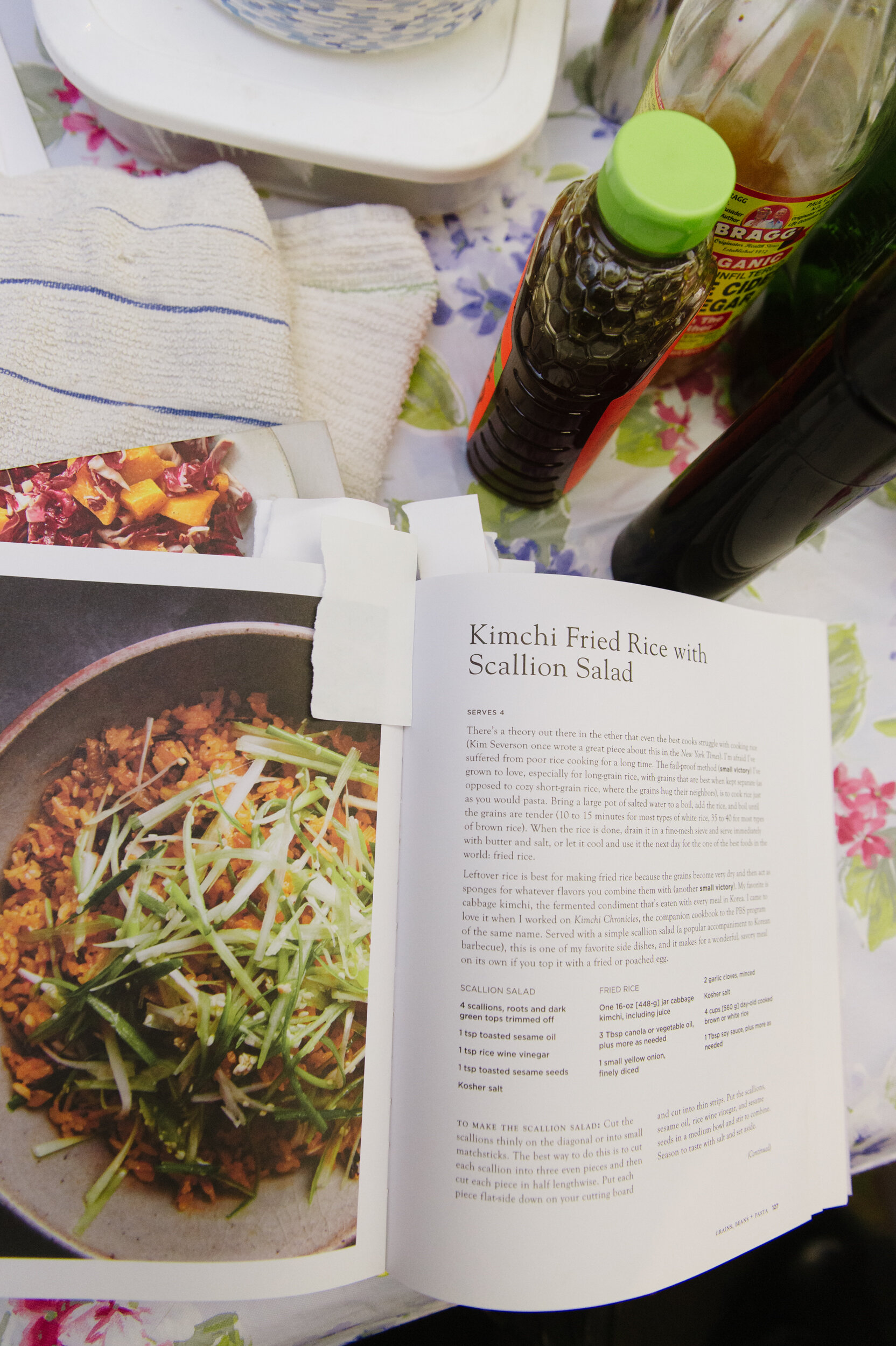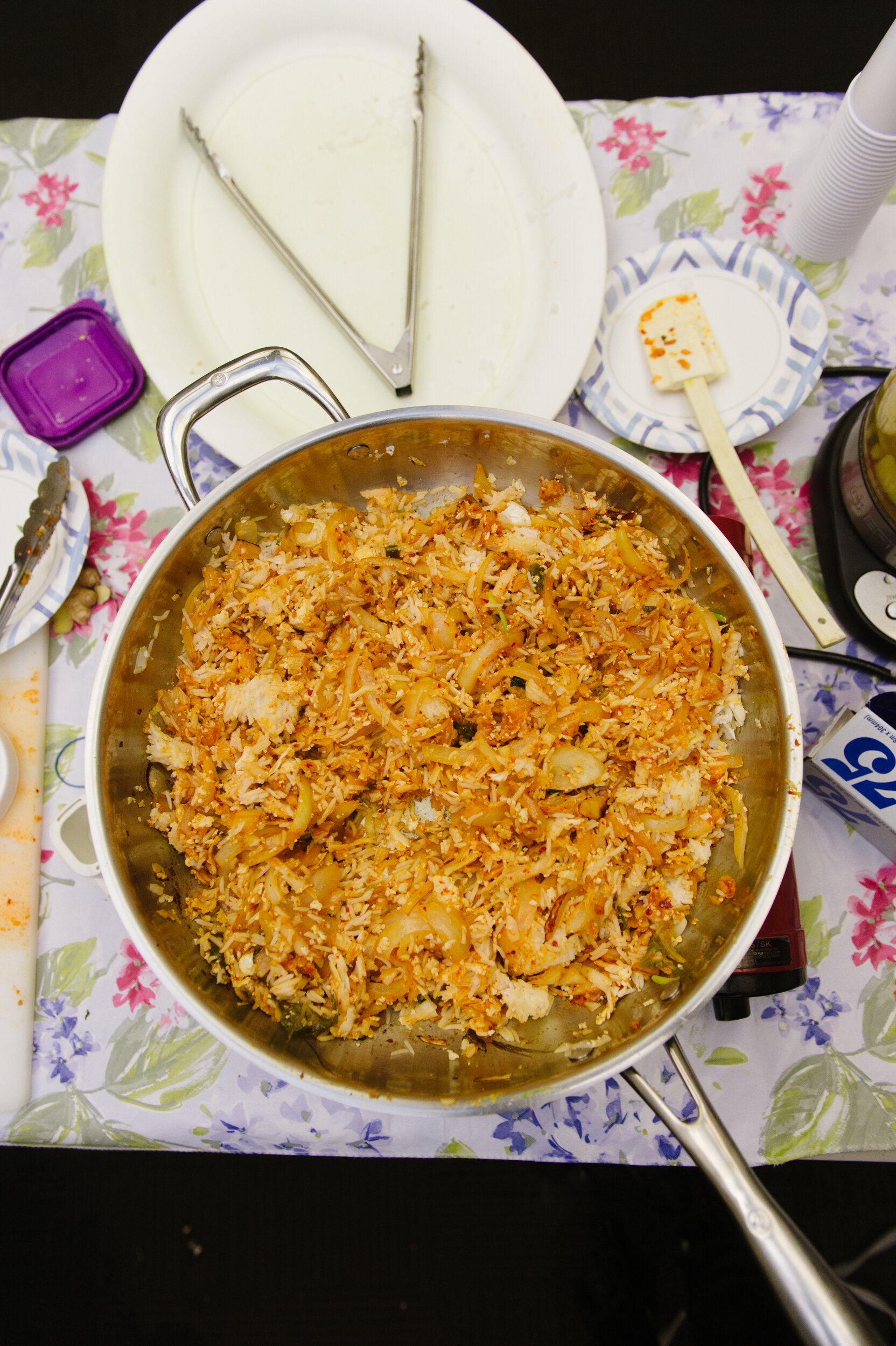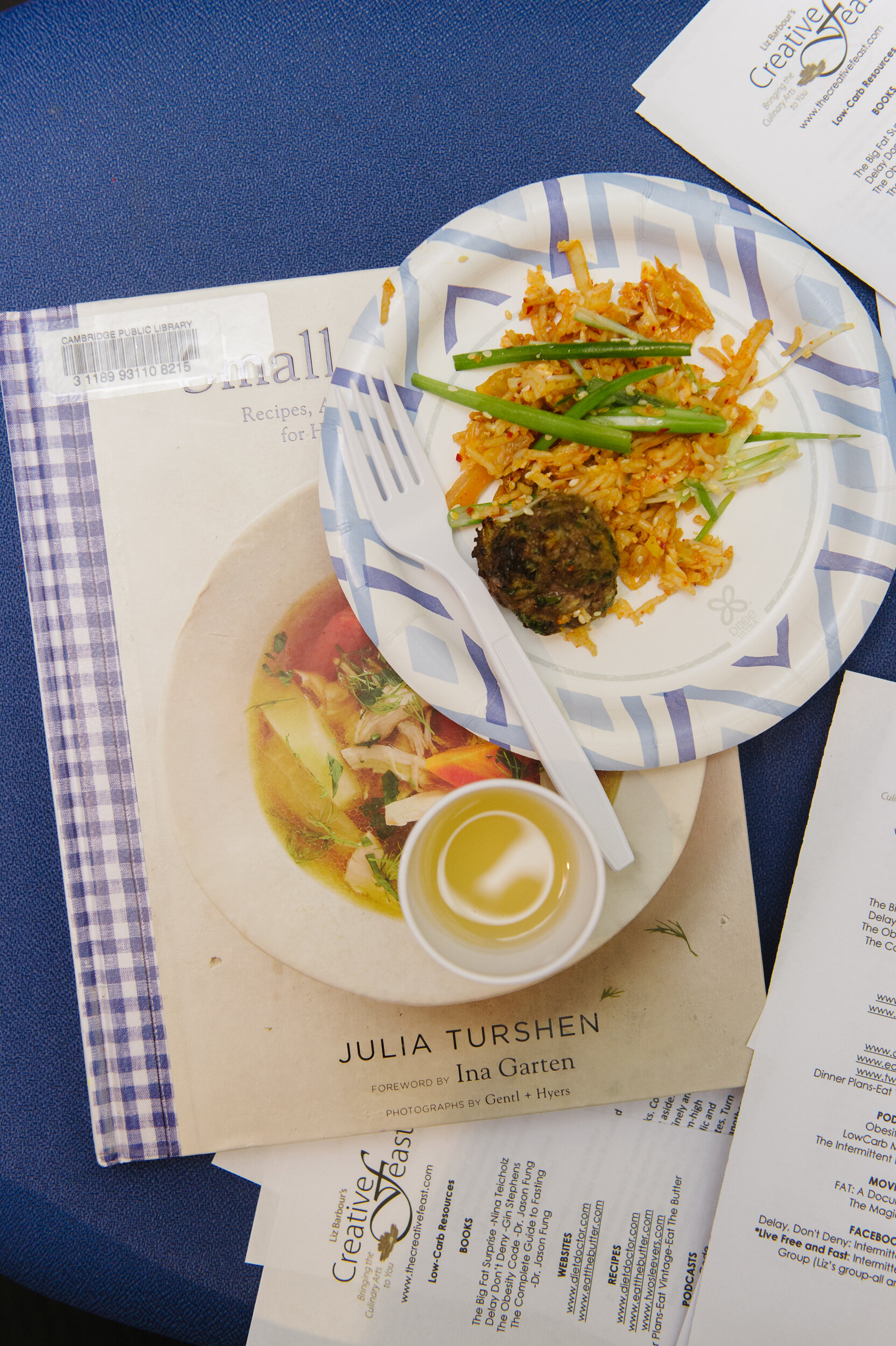Check ‘Em Out: Connections flourish at public library cookbook clubs
Photos by Katie Noble
Don’t judge a book by its cover, unless you take a bite out of it first. Local public libraries host cookbook clubs, where food lovers gather, swap recipes and learn a thing or two about new dishes. Everyone speaks the same language: food.
Sarah R. Hogan, head of circulation at the Wayland Free Public Library, began her Cookbook Club with a coworker in 2015. She and Corey Purcell, circulation assistant, host the club on the second Thursday of each month, 6–7:30pm.
Following recipes in Mario Batali’s Big American Cookbook, patrons transform the Raytheon Room into an informal dinner party. (Book suggestions are made by patrons and this one was chosen before Batali’s fall from grace.) “We try to include various cooking styles in our lineup, such as vegetarian, paleo or recipes from different parts of the world,” says Hogan.
Steve Kandrac and Nancy Curran made a double batch of Brunswick stew filled with chicken, tomatoes, lima beans and a touch of hot sauce. They get to cook dishes they wouldn’t normally try. Jeannine Kerwin makes the table laugh when she says, “If the recipe is delicious, we are good cooks. If it’s bad, it must be a bad cookbook.” Mindy Popp loves cookbook clubs so much, she’s joined three.
The Cookbook Club is open to everyone. Registration is appreciated. Fifteen copies of the book are reserved, but there’s a copy at the circulation desk for patrons to browse through. Small recipe cards are provided. “We also encourage our attendees to bring their own plates and cutlery to cut down on waste, and some of our long-term members have their own kits they have created just for the club,” says Hogan.
The Marlborough Public Library’s Cookbook Club started in November 2019. Carla Thompson, a staff member in the circulation department, wrote the proposal for it and handles the nuts and bolts of the entire operation. “I am an enthusiastic home cook and collector of cookbooks. I heard about cookbook clubs at other libraries and thought it would be fun,” says Thompson. The club meets every other month on the third Tuesday, 6:30–8pm. Adults can register online.
Because it is a new program, Thompson prepares baked goods made from the featured cookbook before eachmeeting. This time she has made fruit scones, whipped cream and jam from Jamie’s Food Revolution. A patron has made sweet potato and chorizo soup. “The fresh ginger and molasses cake recipe was a big hit with attendees and staff who ate the leftovers,” says Thompson.
A table adorned with fresh flowers and complementary tea greets patrons when they arrive. The group may be small, but they are lively. What’s most exciting about the club is the easy manner in which people make connections while they eat. “They’ll discuss recipes they tried or techniques they learned about from the book, sharing related cooking experiences, tapping into members’ knowledge for answers to cooking questions,” says Thompson.
There are considerations when picking a cookbook, including diversity of chefs and their cuisine, name recognition of the cookbook and how many books are available in the network. Sometimes they address “scientific principles behind good cooking; fresh, local, affordable recipes; healthy twists on comfort foods; or quick preparation techniques,” says Thompson.
The Watertown Free Public Library’s Cook the Books Club began about four years ago when Aimee Lambert, reference and adult services librarian, was approached by a patron with an interest in a cooking club. “It had been a goal of mine for years and the inquiry was the push I needed to get it started,” says Lambert.
The club meets in the Raya Stern Trustee Room, on the second Wednesday of each month, 7–8:30pm. No registration is required. Themes rather than cookbooks are picked. They’ve cooked colors, specific ingredients and cuisines from around the world, but somehow the results are always well-balanced meals. A recent feast included butternut squash salad, corn chowder, chicken wings, mac and cheese and beef stew for dinner, with rum cake, chocolate chip shortbread, key lime bars and chocolate-glazed orange cake for dessert.
Based on personal preferences, patrons choose the cookbook and dish they want to prepare. Some people may want to cook from new cookbooks, but others may only be comfortable referencing their food-stained favorites.
According to Lambert, “People can expect two things: to receive a warm welcome and to leave with a full stomach.” And takeout containers filled with leftovers. There have been many memorable dishes over the years. “The one that stands out for me, though, was beet ice cream that was made for the theme of unique ingredients. Honestly, it was excellent,” says Lambert.
There is a special bond that forms when people break bread together. “Over the years the group has been a support for participants going through cancer diagnoses, loss of loved ones and jobs and it has also celebrated life transitions and a wedding. New people are always welcomed like family,” says Lambert.
Norfolk Public Library’s former library director began the Read It and Eat It: A Cookbook Discussion Group in 2015. Sarah Ward, associate director, had attended meetings as a participant, but when the baton was passed, she took the lead. “Our library patrons and staff have always had a great interest in cooking, so we saw this as an opportunity to reach patrons who didn’t want to be part of a traditional book club,” says Ward.
The group meets approximately every six weeks, 7–8pm in the Community Room. Cookbooks are chosen based on popularity and availability in the library system. A core group of 12 patrons attend each meeting, but there are spots available for new attendees to join. Registration is required. (If you are in need of kitchen equipment, take a peek at the library’s Stuffbrary.)
When patrons arrive, they sign a book. “This book is where we keep copies of each recipe so at any time you can come in and make a copy of a dish you really liked,” says Ward. While bringing a prepared dish is encouraged, no one should shy away if they can’t bring something. Ward even created a private Facebook group for patrons.
Three past events stand out: Ottolenghi night, because each meal was so delicious. Slow cooker night, because most of the town lost power and there might have been a mild panic when Crock-Pots were lined up in the meeting room all day. And Community Cookbook night. “What everyone walked away with is that some dishes are classics and others show just how much tastes have changed. Sometimes retro recipes are a fond memory and perhaps should stay that way,” says Ward.
Although originally geared for adults, times are changing. “Just this year we started a Read It and Eat It Jr. program with our Youth Services Librarian, Courtney Allen. It has been a hit and the kids in the sixth grade are already asking for a teen version so they can keep attending,” says Ward.
The Read It and Eat It Throwdown, a large end-of-year event, is the be-all and end-all of throwdowns. Participants compete in a bracket system for savory dishes and desserts.
“I invite different figures in Norfolk Town Government or local businesses to come in and judge. I think this is a great way for people to meet town administrators in a low-key, fun setting. The winners get their names engraved on a plaque and bragging rights for the year,” says Ward.
In 2018, Beverly Public Library’s assistant communications librarian, Katie Nelson, and Laurie Formichella, head of technical services, created the Cookbook Club. But there’s a twist. Patrons are given a mystery ingredient. “It really demonstrates the variety of what the library does for the community. We are not just a place for books, but also a community and social gathering place,” says Nelson.
The club meets once a quarter, 6–8pm, and while the event is geared toward adults, the sky’s the limit. Registration is required. “We’ve had a grandmother and granddaughter duo who have come a couple of times and it is a lot of fun to have that wide an age range,” says Nelson.
Initially, spices were used as the mystery ingredient. They are available in sealed packets and have a long shelf life. For sanitary reasons, ingredients are never taken back once they leave the building. “We have done za’atar, which I think was one of the most unusual; fennel seed; coriander; herbes de Provence and garam masala,” says Nelson. One month, patrons were given two ingredients: a bar of baking chocolate and olives. They didn’t have to be used in the same dish. “We got some really creative results, including a savory kalamata cheesecake square with a rosemary chocolate drizzle and a couple of delicious and very different chicken moles.”
There have been many memorable dishes. “Someone made an herbes de Provence and rose olive oil cake that I still think about. But I think my favorites are the ones where people swing for the fences and try something completely out of their comfort zone,” says Nelson.
One of the librarians always makes bouquets with fresh flowers for table centerpieces. Once people have served themselves, conversations swirl around the room about what worked, what didn’t or any special gadgets that may have been used. “I have learned some really useful tips, like freezing ginger makes it easier to grate and last longer.” As the night draws to a close, recipes are collected, scanned and emailed to anyone who registered for that night’s program.
Key takeaway: Be kind to yourself. “We always tell people, even if they burn their dish to a crisp, don’t let that keep them away; come and let everyone know what you learned for next time,” says Nelson.
Local libraries with cookbook clubs:
Agawam Public Library
Bedford Free Public Library
Belmont Public Library
Beverly Public Library
Harvard Public Library
Marlborough Public Library
Norfolk Public Library
Robbins Library (in Arlington)
Somerville Public Library
Watertown Free Public Library
Wayland Public Library
This story appeared in the Spring 2020 issue and was written before the Covid-19 outbreak in the US.



